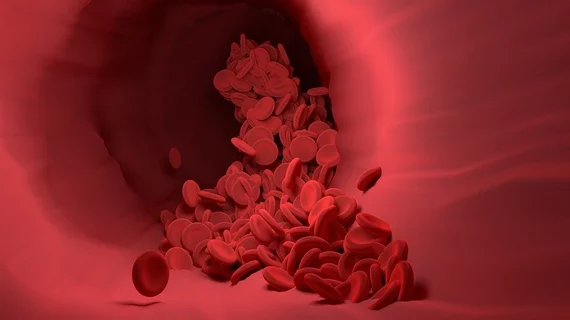GI bleeding often mistaken as side effect of blood thinners when it could indicate cancer
Physicians who treat individuals with AFib may mistake gastrointestinal bleeding as a side effect of their patients’ blood thinners when it may, in fact, be an early warning sign for bowel cancer, according to a new study.
The study, authored by Peter Vibe Rasmussen, of Herlev-Gentofte University Hospital at the University of Copenhagen, and published Feb. 7 in the European Heart Journal, involved more than a quarter of a million Danish residents with atrial fibrillation. AFib patients are commonly prescribed oral blood thinners like warfarin, apixaban and dabigatran for stroke prevention, and GI bleeding is a side effect of those drugs in around 1% to 2% of patients.
Rasmussen and his team identified all diagnosed AFib patients aged 18 to 100 in Danish national registries between 1996 and 2014, including all patients who took any oral anticoagulant. A total of 125,418 people were eligible for the study and followed for health outcomes through 2015.
The researchers logged 2,576 cases of lower GI bleeding in the AFib patients over three years of treatment. Of those patients, 140 were diagnosed with bowel cancer within a year of bleeding onset.
“We found that between 4% and 8% of atrial fibrillation patients who experienced bleeding from their lower gastrointestinal tract were diagnosed with bowel cancer,” Rasmussen said in a release. “Less than 1% of patients were diagnosed with bowel cancer if they did not have bleeding.”
The risk of a bowel cancer diagnosis seemed to correspond with age. In the study, patients aged 65 or younger with bleeding were 24 times more likely to have bowel cancer than their counterparts without bleeding, and patients aged 71 to 75 with bleeding were 11 times more likely than their peers to have bowel cancer.
“These high absolute risks of bowel cancer associated with bleeding provide a strong argument that if blood is detected in the stools of patients being treated with oral anticoagulants, this is something doctors should worry about,” Rasmussen said. “Our findings underline the important point that patients with gastrointestinal bleeding should always be offered meticulous clinical examination, irrespective of whether or not they are taking anticoagulants. It should not be dismissed as a mere consequence of anticoagulant treatment.”

